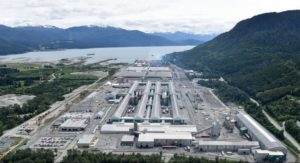“Easy” Trump tariffs cast shadow over B.C. aluminum smelter

Rio Tinto Alcan's Kitimat aluminum smelter in northwest coastal British Columbia. Source: Rio Tinto Alcan.
U.S. President Donald Trump fired the first shots in what could be a global trade war after promising to impose tariffs on imports of steel and aluminum. Canada, the biggest supplier of steel and aluminum to the United States, said it would retaliate if hit by the U.S. tariffs.

Trump said he intends to slap a 25% duty on steel imports and 10% on aluminum in order to protect the national industry. However, the dollar and Wall Street shares slumped as the plan sparked fears of a trade war and worries about the impact on the world’s largest economy.
Such a move would hurt companies that ship steel and aluminum from Canada, including Rio Tinto Plc [RIO-NYSE] and Stelco Holdings Inc. [STLC-TSX, STZHF-OTC].
The threat from Trump comes after a US $4.8 billion modernization of Rio Tinto Alcan’s 60-year-old Kitimat aluminum smelter in British Columbia.
The modernization employed the latest evolution in Rio Tinto Alcan’s state-of-the-art APTM technology and boosted production to 420,000 tonnes per year.
The project simultaneously reduced the smelter’s overall emissions by nearly 50%, including some 500,000 tons per year of greenhouse gases.
The modernized aluminum smelter began operating in mid-2015, providing full-time employment for approximately 1,000 workers. It ranks as one of the largest manufacturing complexes in the province and is a significant contributor to economic and community sustainability in northern B.C.
Trump tweeted on Friday morning that “When a country (USA) is losing many billions of dollars on trade with virtually every country it does business with, trade wars are good and easy to win.”
Published reports said the unveiling of tariffs on Thursday March 1 reflected a somewhat chaotic White House, with reporters noting that they had been given little warning of the developments and the press secretary implying that the details were still being refined.
The President is expected to detail the imposition of tariffs next week.
Meanwhile, U.S. Federal Reserve Chairman Jerome Powell said on Thursday there was no evidence the U.S. economy is overheating and labour markets may still have room to improve as the central bank sticks with a gradual pace of rate hikes.
